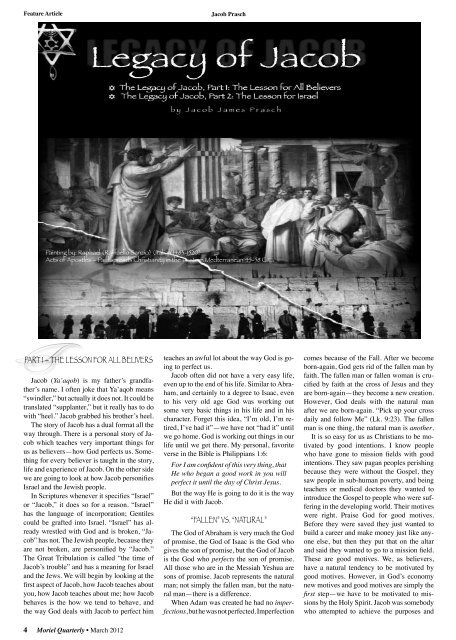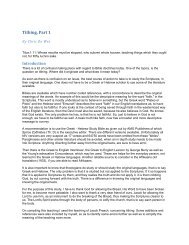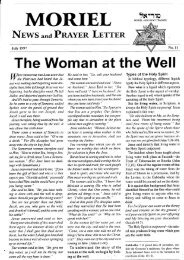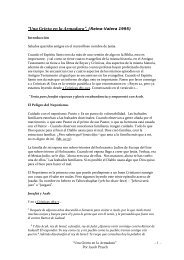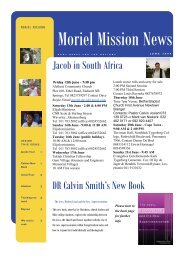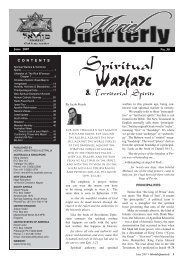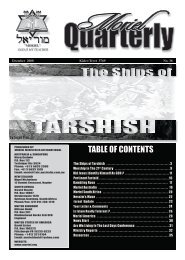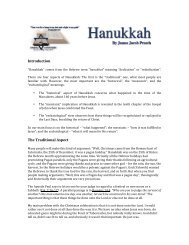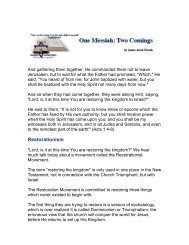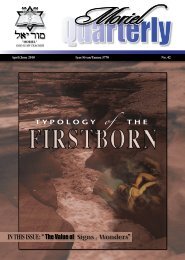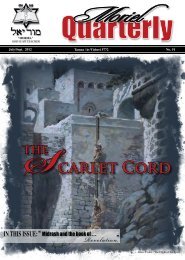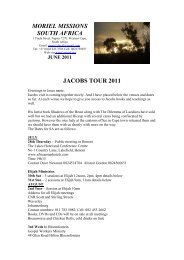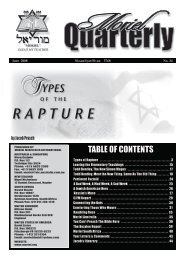The Legacy of Jacob - Moriel Ministries
The Legacy of Jacob - Moriel Ministries
The Legacy of Jacob - Moriel Ministries
Create successful ePaper yourself
Turn your PDF publications into a flip-book with our unique Google optimized e-Paper software.
Feature Article<br />
<strong>Jacob</strong> Prasch<br />
Painting by: Raphael (Raffaello Sanzio) (Italian 1483-1520)<br />
Acts <strong>of</strong> Apostles – Paul spreads Christianity in the Eastern Medterranean 45-58 C.E.<br />
T<br />
Part 1 – the lesson for all belivers<br />
<strong>Jacob</strong> (Ya’aqob) is my father’s grandfather’s<br />
name. I <strong>of</strong>ten joke that Ya’aqob means<br />
“swindler,” but actually it does not. It could be<br />
translated “supplanter,” but it really has to do<br />
with “heel.” <strong>Jacob</strong> grabbed his brother’s heel.<br />
<strong>The</strong> story <strong>of</strong> <strong>Jacob</strong> has a dual format all the<br />
way through. <strong>The</strong>re is a personal story <strong>of</strong> <strong>Jacob</strong><br />
which teaches very important things for<br />
us as believers—how God perfects us. Something<br />
for every believer is taught in the story,<br />
life and experience <strong>of</strong> <strong>Jacob</strong>. On the other side<br />
we are going to look at how <strong>Jacob</strong> personifies<br />
Israel and the Jewish people.<br />
In Scriptures whenever it specifies “Israel”<br />
or “<strong>Jacob</strong>,” it does so for a reason. “Israel”<br />
has the language <strong>of</strong> incorporation; Gentiles<br />
could be grafted into Israel. “Israel” has already<br />
wrestled with God and is broken, “<strong>Jacob</strong>”<br />
has not. <strong>The</strong> Jewish people, because they<br />
are not broken, are personified by “<strong>Jacob</strong>.”<br />
<strong>The</strong> Great Tribulation is called “the time <strong>of</strong><br />
<strong>Jacob</strong>’s trouble” and has a meaning for Israel<br />
and the Jews. We will begin by looking at the<br />
first aspect <strong>of</strong> <strong>Jacob</strong>, how <strong>Jacob</strong> teaches about<br />
you, how <strong>Jacob</strong> teaches about me; how <strong>Jacob</strong><br />
behaves is the how we tend to behave, and<br />
the way God deals with <strong>Jacob</strong> to perfect him<br />
teaches an awful lot about the way God is going<br />
to perfect us.<br />
<strong>Jacob</strong> <strong>of</strong>ten did not have a very easy life,<br />
even up to the end <strong>of</strong> his life. Similar to Abraham,<br />
and certainly to a degree to Isaac, even<br />
to his very old age God was working out<br />
some very basic things in his life and in his<br />
character. Forget this idea, “I’m old, I’m retired,<br />
I’ve had it”—we have not “had it” until<br />
we go home. God is working out things in our<br />
life until we get there. My personal, favorite<br />
verse in the Bible is Philippians 1:6:<br />
For I am confident <strong>of</strong> this very thing, that<br />
He who began a good work in you will<br />
perfect it until the day <strong>of</strong> Christ Jesus.<br />
But the way He is going to do it is the way<br />
He did it with <strong>Jacob</strong>.<br />
“Fallen” vs. “Natural”<br />
<strong>The</strong> God <strong>of</strong> Abraham is very much the God<br />
<strong>of</strong> promise, the God <strong>of</strong> Isaac is the God who<br />
gives the son <strong>of</strong> promise, but the God <strong>of</strong> <strong>Jacob</strong><br />
is the God who perfects the son <strong>of</strong> promise.<br />
All those who are in the Messiah Yeshua are<br />
sons <strong>of</strong> promise. <strong>Jacob</strong> represents the natural<br />
man; not simply the fallen man, but the natural<br />
man—there is a difference.<br />
When Adam was created he had no imperfections,<br />
but he was not perfected. Imperfection<br />
comes because <strong>of</strong> the Fall. After we become<br />
born-again, God gets rid <strong>of</strong> the fallen man by<br />
faith. <strong>The</strong> fallen man or fallen woman is crucified<br />
by faith at the cross <strong>of</strong> Jesus and they<br />
are born-again—they become a new creation.<br />
However, God deals with the natural man<br />
after we are born-again. “Pick up your cross<br />
daily and follow Me” (Lk. 9:23). <strong>The</strong> fallen<br />
man is one thing, the natural man is another.<br />
It is so easy for us as Christians to be motivated<br />
by good intentions. I know people<br />
who have gone to mission fields with good<br />
intentions. <strong>The</strong>y saw pagan peoples perishing<br />
because they were without the Gospel, they<br />
saw people in sub-human poverty, and being<br />
teachers or medical doctors they wanted to<br />
introduce the Gospel to people who were suffering<br />
in the developing world. <strong>The</strong>ir motives<br />
were right. Praise God for good motives.<br />
Before they were saved they just wanted to<br />
build a career and make money just like anyone<br />
else, but then they put that on the altar<br />
and said they wanted to go to a mission field.<br />
<strong>The</strong>se are good motives. We, as believers,<br />
have a natural tendency to be motivated by<br />
good motives. However, in God’s economy<br />
new motives and good motives are simply the<br />
first step—we have to be motivated to missions<br />
by the Holy Spirit. <strong>Jacob</strong> was somebody<br />
who attempted to achieve the purposes and<br />
<strong>Moriel</strong> Quarterly • March 2012


